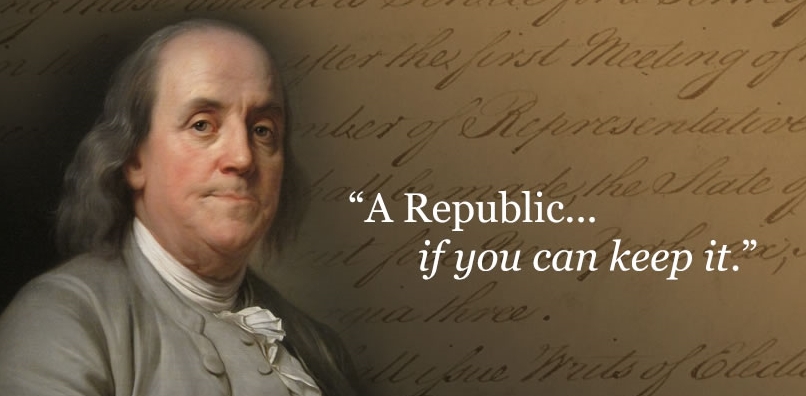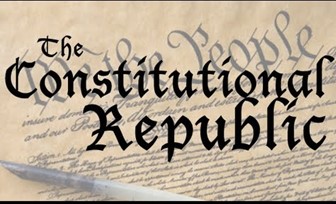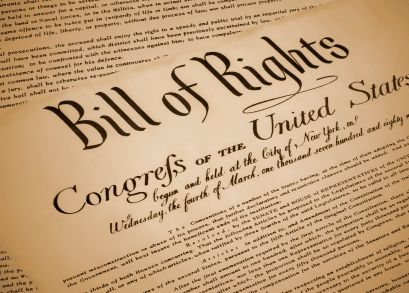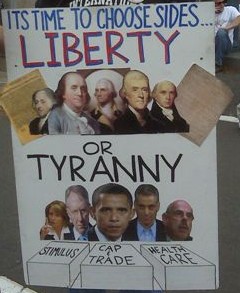

A
Constitutional Republic
Not a Pure Democracy, Theocracy, or
"Christian Nationalism"
"A simple democracy is the Devil's own government." Benjamin Rush
George Washington in his First Inaugural Address, 30 April 1789 stated: "The preservation of the sacred fire of liberty, and the destiny of the republican model of government, are justly considered as deeply, perhaps as finally, staked on the experiment entrusted to the hands of the American People."
The Constitution of America's Republic of Representative Government decree the rules of how to elect office holders, define their responsibilities, functions, and limitations of power.
In 1787, when the Founding Fathers had hammered out the U.S.
Constitution in Independence Hall in Philadelphia,
Benjamin
Franklin told an inquiring woman what the gathering had produced, "A
republic, madam, if you can keep it."

![]() Home
Home
![]() About
About
![]() Contact
Contact
![]() Search
Search
![]() News,
Commentary, & Action
News,
Commentary, & Action ![]() Recommended Books
Recommended Books






Is the experiment based upon Biblical precepts over? Will Americans vote to restore the Constitutional Republic or destroy the American Dream for their descendants by voting for socialism?
"Did I say 'republic?' By God, yes, I said 'republic!' Long live the glorious republic of the United States of America. Damn democracy. It is a fraudulent term used, often by ignorant persons but no less often by intellectual fakers, to describe an infamous mixture of socialism, graft, confiscation of property and denial of personal rights to individuals whose virtuous principles make them offensive." —Westbrook Pegler (1894-1969)
The Founders Were Right - Each passing day only reinforces the wisdom of the principles the Founders chose as the basis for our nation. - By Laura Hollis - In our politically contentious era, it's popular to claim that the Constitution is outdated; that it was drafted in a bygone era by men whose moral failings (like slave ownership) discredit every other contribution they made to the founding of our country. But each passing day only reinforces the wisdom of the principles the Founders chose as the basis for our nation. Here are a few to consider as we celebrate our 247th Independence Day:
...No. 1: Yes, the United States is a "Christian nation"; no,
it is not a theocracy. ...
...No. 2: We are a democratic republic, not a democracy. ...
...No. 3: Ours is not a "majority rules" government. ...
...No. 4: The states, not the people, elect the president. ...
...No. 5: Limits on power are features, not bugs. ...
If "progressives" (I.E. Democrat-Marxists) are afraid of a Judeo-Christian forced "theocracy," then why didn't our Christian Founders establish a coercive authoritarian theocracy? The theocracy they should fear, is that of Islam and Sharia Law. However, the "theocracy" fear, is just a front, a deception. What they really fear is liberty defined within the boundaries of morality as "endowed by the Creator," and not by Big Government. "Progressives" crying "Christian Nationalism" or "theocracy" is simply a diversion and lame excuse used to escape and avoid answering this challenge: What new and improved wisdom do secular liberal humanists use to justify violating "the Laws of Nature and of Nature's God," which was the foundation of America's Founders?
Moses' father-in-law Jethro gave advice to Moses. Exodus 18:21 states: "Moreover thou shalt provide OUT OF ALL THE PEOPLE able men, such as fear God, men of truth, hating covetousness; and place such over them, to be rulers of thousands, and rulers of hundreds, rulers of fifties, and rulers of tens."
(Tara Ross): December 18, 1825, James Madison writes a letter. In it, he takes a moment to discuss the reasons that our Constitution does *not* create a simple democracy. Instead, we have a republican government, with power divided between the national and state governments. The full quote is here: "All power in human hands is liable to be abused. In Governmts. independent of the people, the rights & interests of the whole may be sacrificed to the views of the Governmt. In Republics, where the people govern themselves, and where of course the majority Govern, a danger to the minority, arises from opportunities tempting a sacrifice of their rights to the interests real or supposed of the Majority. No form of Govt. therefore can be a perfect guard agst. the abuse of Power. The recommendation of the Republican form is that the danger of abuse is less than in any other; and the superior recommendation of the federo-Republican system is, that whilst it provides more effectually against external danger, it involves a greater security to the minority against the hasty formation of oppressive majorities."
James Madison - 4th U.S.
President and primary author of the Constitution:
"But I go on this great republican principle, that the people will have virtue
and intelligence to select men of virtue and wisdom. Is there no virtue
among us? If there be not, we are in a wretched situation. No theoretical
checks--no form of government can render us secure. To suppose that any form
of government will secure liberty or happiness without any virtue in the
people, is a chimerical idea. If there be sufficient virtue and intelligence
in the community, it will be exercised in the selection of these men. So
that we do not depend on their virtue, or put confidence in our rulers, but
in the people who are to choose them."
"In the first place, it is to be remembered, that the general government is
not to be charged with the whole power of making and administering laws: its
jurisdiction is limited to certain enumerated objects, which concern all the
members of the republic, but which are not to be attained by the separate
provisions of any."
"Each State, in ratifying the Constitution, is considered as a sovereign
body, independent of all others, and only to be bound by its own voluntary
act. In this relation, then, the new Constitution will, if established, be a
FEDERAL, and not a NATIONAL constitution."
"
"There is no good government but what is republican. That the only
valuable part of the British constitution is so; for the true idea of a
republic is 'an empire of laws, and not of men.' That,as a republic is the
best of governments, so that particular arrangement of the powers of
society, or in other words, that form of government which is best contrived
to secure an impartial and exact execution of the law, is the best of
republics."
"Republics decline into democracies and democracies degenerate into despotisms."
- Aristotle (384-322 BC) "[In a pure democracy], [a] common passion or interest
will, in almost every case, be felt by a majority of the whole; a communication
and concert results from the form of government itself; and there is nothing to
check the inducements to sacrifice the weaker party or an obnoxious individual.
Hence it is that such democracies have ever been spectacles of turbulence and
contention; have ever been found incompatible with personal security or the
rights of property; and have in general been as short in their lives as they
have been violent in their deaths." James Madison "The fundamental
principle of our Constitution, which enjoins that the will of the majority shall
prevail." (Within the framework of the Constitution and Biblical Law, not mob
rule.) George Washington (1732-1799) Father
of the Country, 1st President of the United States
"A democracy is nothing more than mob
rule, where fifty-one percent of the people may take away the rights of the
other forty-nine." --Thomas Jefferson
"The mobs of the great cities add just so much to the support of pure
government as sores do to the strength of the human body. It is the manners
and spirit of a people which preserve a republic in vigor. A degeneracy in
these is a canker which soon eats to the heart of its laws and
constitution." --Thomas Jefferson, Notes on Virginia, Query
XIX, 1782
o
o
Republics and Democracies - By Robert Welch ...Madison
and Hamilton and Jay and their compatriots of the convention prepared and
adopted a constitution in which they nowhere even mentioned the word
democracy, not because they were not familiar with such a form of
government, but because they were. The word democracy had not occurred in
the Declaration of Independence, and does not appear in the constitution of
a single one of our fifty states, which constitutions are derived mainly
from the thinking of the Founding Fathers of the Republic, for the same
reason. They knew all about democracies, and if they had wanted one for
themselves and their posterity, they would have founded one.
See Also:
The
Electoral College was designed as a major ingredient in the
Republic, versus a democracy, to prevent "mob rule" in the states when
electing the President.
"That Book (the Bible) is
the rock on which our Republic rests."
Andrew Jackson
"It has been observed, by an honorable gentleman, that a pure
democracy, if it were practicable, would be the most perfect government.
Experience has proved that no position in politics is more false than this.
The ancient democracies, in which the people themselves deliberated, never
possessed one feature of good government. Their very character was tyranny;
their figure, deformity. When they assembled, the field of debate presented
an ungovernable mob, not only incapable of deliberation, but prepared for
every enormity." ~ Alexander Hamilton
Exodus 18:17-27 (BBE)
But for the rest, take from among the people able men, such as have the fear of God, true men hating profits wrongly made; and put such men over them, to be captains of thousands, captains of hundreds and of fifties and of tens; And let them be judges in the causes of the people at all times: and let them put before you all important questions, but in small things let them give decisions themselves: in this way, it will be less hard for you, and they will take the weight off you.
If you do this, and God gives approval, then you will be able to go on without weariness, and all this people will go to their tents in peace. So Moses took note of the words of his father-in-law, and did as he had said. And he made selection of able men out of all Israel, and made them heads over the people, captains of thousands, captains of hundreds and of fifties and of tens. And they were judges in the causes of the people at all times: the hard questions they put before Moses; but on every small point they gave decisions themselves. And Moses let his father-in-law go away, and he went back to his land. - By Paul Strand, Chris Mitchell ...One thing after another was revolutionary in this Hebrew Republic, such as the tribes electing their own leaders. And that all people were to be treated as equals. "Israel was the beginning of the concept of equality on planet earth," Federer said. It was also the first nation where everyone was taught to read, so they all could be taught the law. And each had a hand in enforcing it and maintaining it, along with the nation itself. So they didn't need a standing army, which in many nations becomes a tool in the hands of a power-hungry ruler. "You have a king, he has an army to enforce his will," Federer explained. "In Israel, every man was in the militia and armed and ready at a moment's notice to defend his family and his community." He added, "Israel had no police. Not only did everyone get taught the law, everyone was responsible to help enforce the law." - ...The error which limits republican government to a narrow district has been unfolded and refuted in preceding papers. I remark here only that it seems to owe its rise and prevalence chiefly to the confounding of a republic with a democracy, applying to the former reasonings drawn from the nature of the latter.
The true distinction between these forms was also adverted to on a former occasion. It is, that in a democracy, the people meet and exercise the government in person; in a republic, they assemble and administer it by their representatives and agents. A democracy, consequently, will be confined to a small spot. A republic may be extended over a large region.
...Under the confusion of names, it has been an easy task to transfer to a republic observations applicable to a democracy only; and among others, the observation that it can never be established but among a small number of people, living within a small compass of territory.
James Madison, Federalist No. 44 - "What is to be the consequence, in case the Congress shall misconstrue this part [the necessary and proper clause] of the Constitution and exercise powers not warranted by its true meaning, I answer the same as if they should misconstrue or enlarge any other power vested in them...the success of the usurpation will depend on the executive and judiciary departments, which are to expound and give effect to the legislative acts; and in a last resort a remedy must be obtained from the people, who can by the elections of more faithful representatives, annul the acts of the usurpers."
(Separation of Powers) - An ELECTIVE DESPOTISM was not the government we fought for; but one which should not only be founded on free principles, but in which the powers of government should be so divided and balanced among several bodies of magistracy, as that no one could transcend their legal limits, without being effectually checked and restrained by the others.Tenth Amendment of the U.S. Constitution: "The powers not delegated to the United States by the Constitution, nor prohibited by it to the States, are reserved to the States respectively, or to the people."
 "Each of these States is sovereign under the Constitution; and if we
wish to preserve our liberties, the reserved rights and sovereignty of
each and every State must be maintained. [God forbid that any man should
ever make the attempt [undermine State sovereignty]. Let that
Constitution ever be trodden under foot and destroyed, and there will
not be wisdom and patriotism enough left to make another that will work
half so well. Our safety, our liberty, depends upon preserving the
Constitution of the United States as our fathers made it, inviolate, at
the same time maintaining the reserved rights and the sovereignty of
each State over its local and domestic institutions, against Federal
authority, or any outside interference." --Abraham Lincoln
- Sixteenth President of the United States
"Each of these States is sovereign under the Constitution; and if we
wish to preserve our liberties, the reserved rights and sovereignty of
each and every State must be maintained. [God forbid that any man should
ever make the attempt [undermine State sovereignty]. Let that
Constitution ever be trodden under foot and destroyed, and there will
not be wisdom and patriotism enough left to make another that will work
half so well. Our safety, our liberty, depends upon preserving the
Constitution of the United States as our fathers made it, inviolate, at
the same time maintaining the reserved rights and the sovereignty of
each State over its local and domestic institutions, against Federal
authority, or any outside interference." --Abraham Lincoln
- Sixteenth President of the United States
"On every question of construction, let us carry ourselves back to
the time when the Constitution was adopted, recollect the spirit
manifested in the debates, and instead of trying what meaning may be
squeezed out of the text, or invented against it, conform to the
probable one in which it was passed."
--Thomas Jefferson
(1743-1826) Third President of the United States
"The first and governing maxim in the interpretation of a statute is
to discover the meaning of those who made it." --James
Wilson (1742-1798) Founding Father, assisted in drafting the
Constitution, Supreme Court Justice
"The state governments, I think, will not be endangered by the powers vested by this Constitution in the general government. While I have attended in Congress, I have observed that the members were quite as strenuous advocates for the rights of their respective states as for those of the Union. I doubt not but this will continue to be the case, and hence I infer that the general government will not have the disposition to encroach upon the states. But still the people themselves must be the chief support of liberty. While the great body of the freeholders (voters) are acquainted with the duties which they owe to their God, to themselves, and to men, remain free. But if ignorance and depravity should prevail, they will inevitably lead to slavery and ruin." --Samuel Huntington (1731-1796) Founding Father, patriot and statesman
"Another not unimportant consideration is, that the powers of the general government will be, and indeed must be, principally employed upon external objects, such as war, peace, negotiations with foreign powers, and foreign commerce. In its internal operations it can touch but few objects, except to introduce regulations beneficial to the commerce, intercourse, and other relations, between the states, and to lay taxes for the common good. The powers of the states, on the other hand, extend to all objects, which, in the ordinary course of affairs, concern the lives, and liberties, and property of the people, and the internal order, improvement, and prosperity of the state." --Joseph Story, Commentaries on the Constitution, 1833
-------
Excerpt from: U.S. Supreme Court PACIFIC STATES TELEPHONE & TELEGRAPH CO. v. STATE OF OREGON, 223 U.S. 118 (1912) 223 U.S. 118 - PACIFIC STATES TELEPHONE & TELEGRAPH COMPANY, Plff. in Err., v. STATE OF OREGON. No. 36. - Argued November 3, 1911. Decided February 19, 1912.
1. Difference between a republic and democracy.
2. In ascertaining the meaning of the phrase 'republican form of government,' the debates of the constitutional conventions and the federalist papers are of great importance, if not conclusive.
3. The framers of the Constitution recognized the distinction between the republican and democratic form of government, and carefully avoided the latter.
4. The extent of territory of the states alone sufficed, in the judgment of the framers of the Constitution, to condemn the establishment of a democratic form of government.
5. The form of state government perpetuated by the Constitution was the republican form, with the three departments of government, in force in all the states at the time of the adoption of the Constitution.
6. The history of other nations does not furnish the definition of the phrase 'republican form of government,' as those words were used by the framers of the Constitution. They distinguish the American from all other republics by the introduction of the principle of representation.
7. Initiative legislation is invalid because government by the people directly is inconsistent with our form of government.
8. The well-known practices of (a) adopting state Constitutions by popular vote, and of (b) local legislation in 'town meetings,' furnish no precedent for the lodgment of legislative power in the ballot box. [223 U.S. 118, 139] V.
'The Federal Constitution presupposes in each state the maintenance of a republican form of government and the existence of state legislatures, to wit: Representative assemblies having the power to make the laws; and that in each state the powers of government will be divided into three departments: a legislature, an executive, and a judiciary. One of these, the legislature, is destroyed by the initiative.
 Tyranny
Naturally Arises out of Democracy By
Michael
Peroutka - Does it drive you crazy when you hear politicians and
talking heads refer to
America as a "democracy"? If it does, I sympathize with you. And so
do the founders. Here's what
James Madison, our fourth President and the man they call the "Father
of the Constitution," had to say about democracies: "Democracies
have ever been spectacles of turbulence and contention; have ever been
found incompatible with personal security or the rights of property; and
have in general been as short in their lives as they have been violent
in their deaths."
Tyranny
Naturally Arises out of Democracy By
Michael
Peroutka - Does it drive you crazy when you hear politicians and
talking heads refer to
America as a "democracy"? If it does, I sympathize with you. And so
do the founders. Here's what
James Madison, our fourth President and the man they call the "Father
of the Constitution," had to say about democracies: "Democracies
have ever been spectacles of turbulence and contention; have ever been
found incompatible with personal security or the rights of property; and
have in general been as short in their lives as they have been violent
in their deaths."
So, despite what you have repeatedly heard, the purpose and the
premise of the Constitution of these united States is the establishment
of a Christian Republic under God,
NOT a democracy. Now there are many evil persons (and many of their
ignorant followers) who want us to be a
democracy.
They would prefer that the whims and fancies of the majority,
manipulated by the media and by elitist power brokers, become the law of
the land. Under such a system, neither our lives nor our private
possessions are safe. But, in a
Christian Republic governed by a Constitution which is rooted in
Biblical law, all life and property are safe.
Why? Well in a Christian Republic law rules, not the majority. Now
do you see why the politicians and the talking heads keep calling us a "democracy"?
They want you to believe that we are one. And that should drive you
crazy.
The Tyranny of the Minority
by A.W.R. Hawkins - When the Founding Fathers created this nation, they designated it a republic rather than a democracy. They did so because a republic is fixed and tends toward stability over time, whereas a democracy, which is always in flux, is prone to violent dissolution at any moment. In fact, many of them referred to democracy as "mob rule," and wanted to avoid it like the plague for fear that it could provide a faction the opportunity to access to the levers of political power and change the course of the nation for the worse in a relatively short period of time.James Madison, Federalist No. 55, 1788 -
"As there is a degree of depravity in mankind which requires a certain degree of circumspection and distrust: So there are other qualities in human nature, which justify a certain portion of esteem and confidence. Republican government presupposes the existence of these qualities in a higher degree than any other form. Were the pictures which have been drawn by the political jealousy of some among us, faithful likenesses of the human character, the inference would be that there is not sufficient virtue among men for self-government; and that nothing less than the chains of despotism can restrain them from destroying and devouring one another."